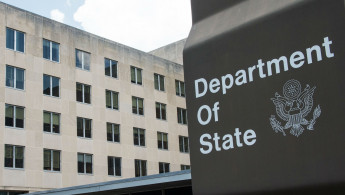Advocates push for 'temporary protected status' for Lebanese in US
Advocates are urging for the designation of Temporary Protected Status (TPS) for Lebanese in the United States, which would allow non-residents to gain an official status while their home country is in crisis.
A bill that was first introduced in Congress in 2021, with the help of NGOs, has again been gaining ground with a letter led by Representatives Rashida Tlaib and Debbie Dingell of Michigan and Zoe Lofgren of California.
"Given the extraordinary, overlapping challenges in the country, Lebanon clearly qualifies for TPS designation," the lawmakers write in a letter signed by dozens of Congress members to Secretary of State Antony Blinken and Secretary of Homeland Security Alejandro Mayorkas
"The myriad issues facing Lebanon render the safe return of Lebanese nationals currently residing in the United States impossible and largely mirror the interrelated crises facing other countries, such as Haiti and Venezuela, that have received this designation," the letter continues.
The designation of TPS is applied to countries, subject to review, that are experiencing ongoing conflict that prevents their citizens from safely returning. In the case of Lebanon, the country has been experiencing instability since its 2019 financial crisis, exacerbated by the 2020 Beirut Port explosion, killing thousands and leaving hundreds of thousands homeless.
The push for Congress to revive the bill, which would affect some 12,000 Lebanese living in the US, is being advocated for by NGOs, which have issued letters detailing the crises afflicting Lebanon.
Ibrahim Intabli is one of them. After entering the US as a tourist around a month ago, visiting from the United Arab Emirates, he started asking about TPS, given Lebanon's multiple crises that would make it difficult for him to return to his home country or even to another country in the region, where good jobs are becoming increasingly hard to come by for the Lebanese diaspora.
What made him sure he needed to leave was what happened on his last visit to Lebanon. Within days of his arrival, he was visiting family when he got caught up in a nearby demonstration over price hikes. When he tried to get through, says he was attacked, leaving him with bruises and a bloody nose.
"It was a really unpleasant experience," he tells The New Arab. "I asked a lawyer here if I could apply for protection. They said you don't have a case."
Intabli, 32, says, "I can't go back to Lebanon. Every time I do, something bad happens. It's a continuous struggle."
He continued to ask about getting legal protection and then learned about TPS from a legal advisor with the Michigan-based NGO, the Arab Community Center for Economic and Social Services (ACCESS).
He says he is now seeking to change his tourist status after finding a home in Dearborn, where he is taking courses at a local college in electronics in the hopes of gaining more job skills.
"Now, I'm following this student path. It's not something I hadn't planned for, but I'll be hitting two birds with one stone," says Intabli, who no longer has close family in Lebanon.
"I love it so far," he says of Dearborn. "I came at a time when the weather is pretty amazing. I've been told it gets cold later on. Everyone is nice and friendly. It's a good place. I'm seeing Arab nationalities I haven't seen in Lebanon and the UAE. I'm connecting with my Arab heritage."
NGOs are working to help Intabli and many others in similar situations get to stay in the US though a TPS designation. So far, 135 have signed on to a letter urging Blinken, Mayorkas and Biden to give Lebanon TPS designation.
Adam Beddawi, federal policy manager for ACCESS, who has spent around a year advocating for the TPS designation for Lebanon, tells TNA that in the coming weeks, he's hoping to sit down with the Biden administration to make their case.
"We want to educate people about what's going on and the impact this would have," he says. "We're working to get members of Congress on board. We're doing research and connecting with people on the ground to get a sense of the conditions of people who have been affected."
Carolyn Tran, co-director for Communities United for Status and protection, notes that Lebanon meets requirements for TPS designation and that when the war in Ukraine broke out, Ukraine was immediately given TPS designation.
"We're not saying we don't want them to have TPS. We want the same standard applied to other countries," she tells TNA. "We know the administration can work quickly. Our message is that people should not be sent back to unsafe conditions."





 Follow the Middle East's top stories in English at The New Arab on Google News
Follow the Middle East's top stories in English at The New Arab on Google News


